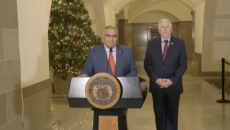JEFFERSON CITY, Mo. — The Missouri Department of Revenue has moved to ensure changes to the state’s withholding calculation formula are in line with state law.
According to a letter sent to the State Auditor’s Office, the department is finalizing drafts of an emergency amendment and amended regulation regarding the withholding tax calculation.
“Upon my approval this week, both documents will be provided to the Governor’s Office for his final approval, pursuant to Executive Order 17-03. Once the Governor approves the emergency amendment and the amended regulation, they will be filed with the Secretary of State’s Office, as required by law,” Acting Director Ken Zeller wrote on April 11, 2019.
The issues at play are changes DOR made to the withholding formula in January 2019 without going through the traditional rulemaking process. A review conducted by the State Auditor’s Office determined the changes were made “unlawfully.”
“Amending the withholding formula regulation through the rulemaking process mandated by Chapter 536, RSMo, is necessary to inform the General Assembly of any changes in the rules through notice to the Joint Committee on Rules,” stated the audit.
Following the April 2 public release of the audit, Missouri Treasurer Scott Fitzpatrick wrote a letter detailing the state withholding tables have likely been in conflict with state regulations since a 1993 tax change.
“Had the department implemented the withholding instructions pursuant to this antiquated regulations, the result would have been incompatible with current tax law and would have resulted in substantial under withholding,” wrote Fitzpatrick.
The withholding formula has been under scrutiny for months following a series of public hearings with then-DOR Director Joel Walters as fiscal hawks closely monitored revenue numbers.
State revenues for Fiscal Year 2019 have been lagging for months. Officials pointed to changes in the federal tax code which, when implemented, reduced the amount the state withheld. Through March, collections were lagging 4.3 percent compared to March 2018, down from $6.72 billion last year to $6.43 billion this year.

Alisha Shurr was a reporter for The Missouri Times and The Missouri Times Magazine. She joined The Missouri Times in January 2018 after working as a copy editor for her hometown newspaper in Southern Oregon. Alisha is a graduate of Kansas State University.
























